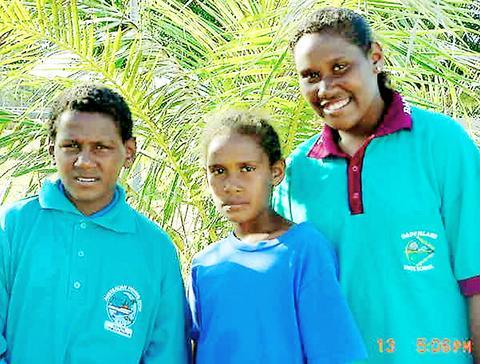Three Australian children survived for six days after their dinghy capsized off the country's north coast, swimming in shark-infested waters between tiny islands in search of food and water.
The children had been on a routine voyage with their parents and a young relative when the dinghy overturned off Australia's Cape York Peninsula on July 6. Their parents urged the children to swim to a rocky outcrop nearby while they stayed behind clinging to the boat.
"It was the last time we saw them," Stephen Nona, 12, told The Sydney Morning Herald.

PHOTO: REUTERS
The three children were rescued on Monday.
With no water on the outcrop, the children had to brave the sea to reach another island.
"We have to swim or we'll die," Stephen told his sisters Ellis, 15, and Norita, 10, as they stood on the barren outcrop.
"We swam all day. We started in the morning and we got to the big island in the afternoon. I found a coconut and skinned it with my teeth," Stephen was quoted by the newspaper as saying.
The Torres Strait Islander family had set out from their home on Badu Island in the Torres Strait to travel 60km to Thursday Island to attend a birthday party -- a routine journey for people who live on scattered islands between Australia's tropical north and Papua New Guinea.
But after 25km the dinghy's motor broke down. The children's father, an experienced seaman, repaired it but the anchor rope became entangled in the motor and the boat capsized.
Stephen, Ellis and Norita eventually made it to the island where, wet and frightened, they huddled together and scanned the sea for their parents. "We prayed to God to bring them, but they did not come," Stephen said.
The children stayed on the rocky outcrop for three days without fresh water. They drank small amounts of seawater and ate the few oysters they could break open with stones.
Last Friday, Stephen decided they must swim to another island if they were to survive.
After swimming all day they reached Matu Island, an atoll about the size of a football field with one coconut tree. The children had swum a total of about 4km through open sea from where their boat had capsized.
For the next three days and nights the children survived on five coconuts, eating coconut flesh and drinking coconut milk, and a few oysters, until they were rescued.

A fire caused by a burst gas pipe yesterday spread to several homes and sent a fireball soaring into the sky outside Malaysia’s largest city, injuring more than 100 people. The towering inferno near a gas station in Putra Heights outside Kuala Lumpur was visible for kilometers and lasted for several hours. It happened during a public holiday as Muslims, who are the majority in Malaysia, celebrate the second day of Eid al-Fitr. National oil company Petronas said the fire started at one of its gas pipelines at 8:10am and the affected pipeline was later isolated. Disaster management officials said shutting the

US Vice President J.D. Vance on Friday accused Denmark of not having done enough to protect Greenland, when he visited the strategically placed and resource-rich Danish territory coveted by US President Donald Trump. Vance made his comment during a trip to the Pituffik Space Base in northwestern Greenland, a visit viewed by Copenhagen and Nuuk as a provocation. “Our message to Denmark is very simple: You have not done a good job by the people of Greenland,” Vance told a news conference. “You have under-invested in the people of Greenland, and you have under-invested in the security architecture of this

UNREST: The authorities in Turkey arrested 13 Turkish journalists in five days, deported a BBC correspondent and on Thursday arrested a reporter from Sweden Waving flags and chanting slogans, many hundreds of thousands of anti-government demonstrators on Saturday rallied in Istanbul, Turkey, in defence of democracy after the arrest of Istanbul Mayor Ekrem Imamoglu which sparked Turkey’s worst street unrest in more than a decade. Under a cloudless blue sky, vast crowds gathered in Maltepe on the Asian side of Turkey’s biggest city on the eve of the Eid al-Fitr celebration which started yesterday, marking the end of Ramadan. Ozgur Ozel, chairman of the main opposition Republican People’s Party (CHP), which organized the rally, said there were 2.2 million people in the crowd, but

JOINT EFFORTS: The three countries have been strengthening an alliance and pressing efforts to bolster deterrence against Beijing’s assertiveness in the South China Sea The US, Japan and the Philippines on Friday staged joint naval drills to boost crisis readiness off a disputed South China Sea shoal as a Chinese military ship kept watch from a distance. The Chinese frigate attempted to get closer to the waters, where the warships and aircraft from the three allied countries were undertaking maneuvers off the Scarborough Shoal — also known as Huangyan Island (黃岩島) and claimed by Taiwan and China — in an unsettling moment but it was warned by a Philippine frigate by radio and kept away. “There was a time when they attempted to maneuver